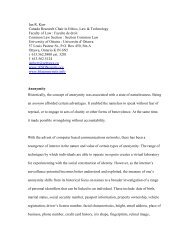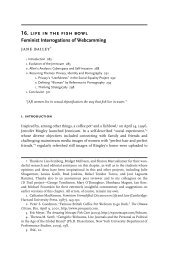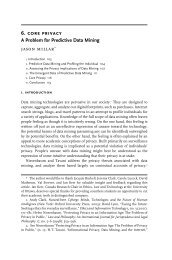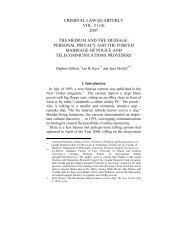Complete Cases Chart - Supreme Court of Canada - On the Identity ...
Complete Cases Chart - Supreme Court of Canada - On the Identity ...
Complete Cases Chart - Supreme Court of Canada - On the Identity ...
You also want an ePaper? Increase the reach of your titles
YUMPU automatically turns print PDFs into web optimized ePapers that Google loves.
Case Name (<strong>Court</strong>)<br />
(Judge)<br />
Location/Method <strong>of</strong> Search Relevant Statutes Issues/Holdings<br />
- (1) whe<strong>the</strong>r <strong>the</strong> search violates s. 8 <strong>of</strong> <strong>the</strong>C<strong>Chart</strong>er? - Y/N<br />
- (2) whe<strong>the</strong>r to exclude evidence by s. 24(2)? – Y/N<br />
Reasoning<br />
- (1) relevant to s.8 + CASES (Kokesch, Plant, Hunter, Tessling, Edwards)<br />
- (2) relevant to 24(2) + CASES (Collins)<br />
Wilson, La Forest<br />
JJ. and Dickson C.J.<br />
(con).<br />
Traffic Stops<br />
R. v. Kokesch<br />
[1990] 3 S.C.R. 3,<br />
Sopinka J. with<br />
Wilson, LaForest<br />
and McLachlin JJ.<br />
(con);<br />
Dickson,<br />
L’Heureux-Dubé,<br />
and Cory JJ. (dis).<br />
- Police conducted a perimeter<br />
search <strong>of</strong> <strong>the</strong> suspect’s home<br />
without reasonable cause or<br />
legal authority.<br />
- <strong>Chart</strong>er, ss. 1, 8, 24(2). - (1) Did <strong>the</strong> police perimeter search violate<br />
s.8?<br />
• YES<br />
- (2) Should <strong>the</strong> evidence be excluded under<br />
s. 24(2)?<br />
• YES (4-3 decision)<br />
- (1) The suspect had a reasonable expectation <strong>of</strong> privacy in <strong>the</strong> perimeter <strong>of</strong> his<br />
home and <strong>the</strong> police lacked reasonable cause or lawful authority to search it.<br />
- Ref. to Hunter (s. 8 protecting reasonable expectation <strong>of</strong> privacy)<br />
Property Search –<br />
Home – Perimeter<br />
R. v. Wong<br />
[1990] 3 S.C.R. 36<br />
La Forest J. with<br />
Dickson,<br />
L'Heureux-Dubé<br />
and Sopinka JJ.<br />
(con); Lamer and<br />
McLachlin JJ.<br />
(con); Wilson (dis).<br />
- The accused rented a hotel<br />
room for gambling.<br />
-Police used video cameras to<br />
record <strong>the</strong> activities in <strong>the</strong> hotel<br />
room.<br />
- <strong>Chart</strong>er, ss. 8, 9, 10(b),<br />
24(2);<br />
- Criminal Code, s.<br />
178.13(2)(c), (d)<br />
(now s.186(4)(c), (d)).<br />
- (1) Does <strong>the</strong> use <strong>of</strong> video recording by <strong>the</strong><br />
police without judicial authorization<br />
constitute a search?<br />
• YES<br />
- (2) Does this search violate s. 8 <strong>of</strong> <strong>the</strong><br />
<strong>Chart</strong>er?<br />
• YES<br />
- (1) This case follows Duarte where unauthorized electronic audio surveillance<br />
violated s. 8 <strong>of</strong> <strong>the</strong> <strong>Chart</strong>er.<br />
• This rule extends to all technologies.<br />
• If a free and open society cannot brook <strong>the</strong> prospect that agents <strong>of</strong> <strong>the</strong> state<br />
should, in <strong>the</strong> absence <strong>of</strong> judicial authorization, have <strong>the</strong> right to record <strong>the</strong> words<br />
<strong>of</strong> whomever <strong>the</strong>y choose, it is equally inconceivable that <strong>the</strong> state should have<br />
unrestricted discretion to target whomever it wishes for surreptitious video<br />
surveillance (para 15)<br />
- Parliament (not <strong>the</strong> courts) should dictate <strong>the</strong> law with regard to <strong>the</strong> use <strong>of</strong> video<br />
recording.<br />
Unwarranted use<br />
<strong>of</strong> video<br />
surveillance to<br />
monitor actions <strong>of</strong><br />
<strong>the</strong> accused in a<br />
hotel room<br />
R. v. Duarte<br />
[1990] 1 S.C.R. 30,<br />
La Forest J. with<br />
- An informant’s apartment<br />
was monitored using audio<br />
recording equipment.<br />
- The informant and <strong>of</strong>ficer<br />
- (3) Should <strong>the</strong> evidence be excluded under<br />
s. 24(2)?<br />
• YES<br />
- <strong>Chart</strong>er, ss. 1, 8, 24(2). - (1) Does making an audio recording without<br />
<strong>the</strong> consent <strong>of</strong> <strong>the</strong> accused violate s.8?<br />
• YES<br />
- Ref. to Hunter (purposive approach <strong>of</strong> s. 8 analysis)<br />
- Ref. to Dyment<br />
- (1) A reasonable expectation <strong>of</strong> privacy in private communications does not exist if<br />
<strong>the</strong> state can record private communications, without constraint, provided only that<br />
it has secured <strong>the</strong> agreement <strong>of</strong> one <strong>of</strong> <strong>the</strong> parties to <strong>the</strong> communication.<br />
- Audio recording is not <strong>the</strong> same as <strong>of</strong>ficers repeating <strong>the</strong>ir version <strong>of</strong> a<br />
17







